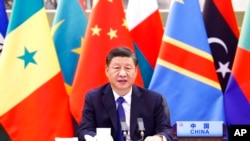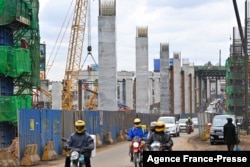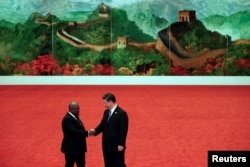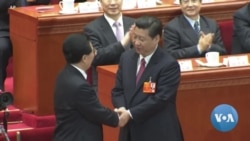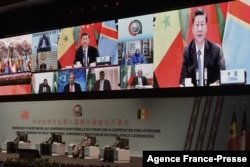Under President Xi Jinping, China's engagement with Africa reached new heights, economically and diplomatically.
During nearly 10 years in power, Xi's trademark Belt and Road Initiative (BRI) saw massive infrastructure projects rolled out across the continent, his government tripled China's financial commitments at the first Forum on China–Africa Cooperation (FOCAC) held under his tenure, and also swayed more African governments to support Beijing's positions at the United Nations.
With Xi now set to be confirmed for a third term in power at this months' Communist Party Congress in Beijing, analysts say what happens at the meeting with Xi and other top leaders is closely followed by African governments.
"It matters very greatly and this is because the relationships with Africa … tend to be highly personalized, so if the leader at any one particular time has a personal interest in Africa, depending on how that leader perceives the African continent, you're going to have very stable and multifaceted relations," Paul Nantulya, a China expert at the Africa Center for Strategic Studies in Washington, told VOA.
Under the founder of Communist China, Mao Zedong, China and Africa had a close relationship, especially as Beijing supported liberation movements on the continent. But under his successor Deng Xiaoping, China was more focused on engaging with the West and reforms at home than on relations with Africa, Nantulya said.
"Xi Jinping has taken the China-Africa relationship to the highest level that it's ever been since the era of Mao Zedong," he said, adding that with Xi sure to get a third five-year term, and perhaps even stay in power longer, he expects those relations to strengthen even more.
Xi himself is only able to run for a third term this year because he changed the constitution in 2018 to allow for it. Some analysts say he's setting himself up to be leader for life.
"It could inspire a mood in Africa to further change or manipulate constitutions so that party leaders can remain in office, this has been a trend that we've seen unfortunately coming back on the African continent," said Nantulya.
But other analysts were less convinced that Xi accounts for the direction of China-Africa relations.
"It's hard to disentangle the impact of one individual from the broad trends of China's globalization and the shifting demand and absorptive capacity on the African side," said Deborah Brautigam, head of the China Africa Research Initiative at Johns Hopkins University.
Cobus van Staden, a China expert at the South African Institute for International Affairs, said Beijing's engagement with Africa predates Xi and is driven by many actors.
"Xi continuing as the head of the party is significant but it doesn't, I think, fundamentally change the nature of the engagement itself," he said.
However, Van Staden noted, Xi has "refined and repackaged" the two regions' relationship, and he does define the diplomatic tenor of the engagement.
Diplomatically winning over global south
The success of China's soft power overtures in Africa have been illustrated by how many countries have followed Beijing's lead when it comes to remaining neutral on Russia's invasion of Ukraine. Analysts say China certainly wants nations in the so-called global south in its ideological corner and the U.S. and Europe have been scrambling to play catch-up.
"My view is that Xi's administration has increasingly created a pro- and anti-China world, where countries divide into those who seek pragmatic relations with China for self-benefit, accept its transactional approach to diplomacy and on the whole care far less about values-issues, and then the other part of the world, largely around the U.S. and its European and other close allies, who of course do believe that values matter," Kerry Brown, professor of Chinese studies at King's College London, told VOA.
"China has become less and less interested in relations with the latter group where they involve it lecturing or seeming to speak down to China, and more aware of having a wide network of alternative relationships particularly in the global south where these issues are not part of the mix," he added.
Steve Tsang, director of the China Institute at the School of Oriental and African Studies at London University, said pursuing relationships with such countries will likely remain a foreign policy priority for Beijing.
"Xi is also determined to compete against the West or the democracies, and to do so, his China will need to woo African countries, particularly the autocracies," Tsang said.
However, he noted, "under Xi, China's economy is likely to slow down, as his policies have not been helpful to growth. A slowing economy will mean less finance for the BRI and thus less money to be spent to woo African countries."
Shifts in China's Africa lending
Amid economic troubles at home and the Chinese Communist Party's unpopular "zero-COVID" policies, as well as constant allegations of "debt-trap diplomacy" from the West over China's lending, economists say lending is already down, leaving African markets vulnerable. At the last regional trade forum FOCAC in 2021, Beijing announced $20 million less in funding for the continent – could China be scaling back in Africa?
"China will never turn away from Africa, for political and economic reasons. But for the time being, the old model of infrastructure-driven financing loans appears unsustainable, given China's own economic shifts," Yun Sun, director of the China program at the Stimson Center, told VOA.
Already the nature of the engagement is changing, with Beijing moving away from hard infrastructure projects like roads and railways, toward investment in information and communications technology, agriculture, green energy and other areas in Africa.
Another means by which China under Xi continues to increase its soft power on the continent is through promoting its governance and party model to Africa's politicians, even starting a political party training school in Tanzania this year that some critics are worried could undermine democracies in the region.
"The training of African politicians and officials will continue despite a scaling down of the BRI," said Tsang.




